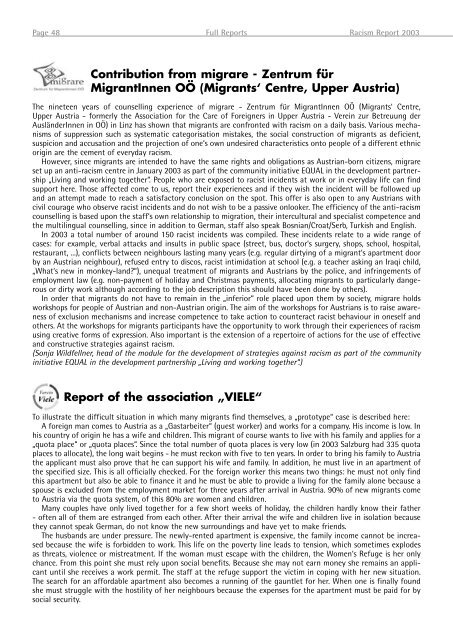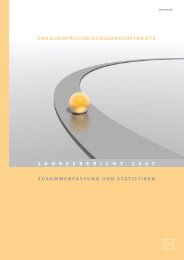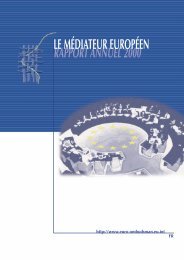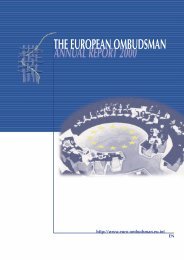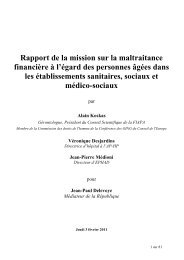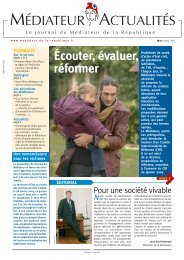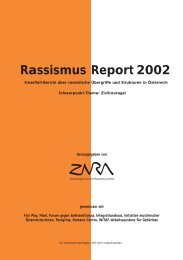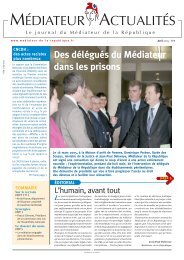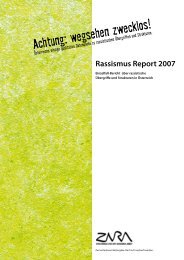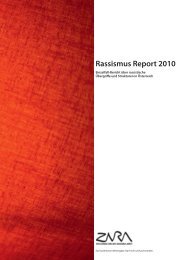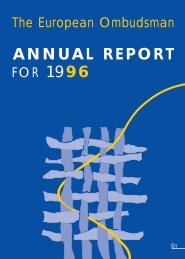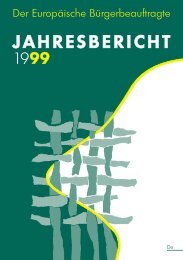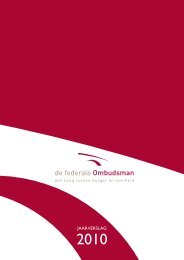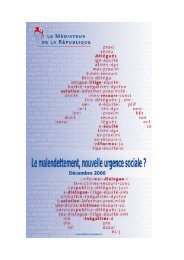Racism Report 2003 - Zara
Racism Report 2003 - Zara
Racism Report 2003 - Zara
You also want an ePaper? Increase the reach of your titles
YUMPU automatically turns print PDFs into web optimized ePapers that Google loves.
Page 48 Full <strong>Report</strong>s <strong>Racism</strong> <strong>Report</strong> <strong>2003</strong>Contribution from migrare - Zentrum fürMigrantInnen OÖ (Migrants‘ Centre, Upper Austria)The nineteen years of counselling experience of migrare - Zentrum für MigrantInnen OÖ (Migrants‘ Centre,Upper Austria - formerly the Association for the Care of Foreigners in Upper Austria - Verein zur Betreuung derAusländerInnen in OÖ) in Linz has shown that migrants are confronted with racism on a daily basis. Various mechanismsof suppression such as systematic categorisation mistakes, the social construction of migrants as deficient,suspicion and accusation and the projection of one‘s own undesired characteristics onto people of a different ethnicorigin are the cement of everyday racism.However, since migrants are intended to have the same rights and obligations as Austrian-born citizens, migrareset up an anti-racism centre in January <strong>2003</strong> as part of the community initiative EQUAL in the development partnership„Living and working together“. People who are exposed to racist incidents at work or in everyday life can findsupport here. Those affected come to us, report their experiences and if they wish the incident will be followed upand an attempt made to reach a satisfactory conclusion on the spot. This offer is also open to any Austrians withcivil courage who observe racist incidents and do not wish to be a passive onlooker. The efficiency of the anti-racismcounselling is based upon the staff‘s own relationship to migration, their intercultural and specialist competence andthe multilingual counselling, since in addition to German, staff also speak Bosnian/Croat/Serb, Turkish and English.In <strong>2003</strong> a total number of around 150 racist incidents was compiled. These incidents relate to a wide range ofcases: for example, verbal attacks and insults in public space (street, bus, doctor‘s surgery, shops, school, hospital,restaurant, ...), conflicts between neighbours lasting many years (e.g. regular dirtying of a migrant‘s apartment doorby an Austrian neighbour), refused entry to discos, racist intimidation at school (e.g. a teacher asking an Iraqi child,„What‘s new in monkey-land?“), unequal treatment of migrants and Austrians by the police, and infringements ofemployment law (e.g. non-payment of holiday and Christmas payments, allocating migrants to particularly dangerousor dirty work although according to the job description this should have been done by others).In order that migrants do not have to remain in the „inferior“ role placed upon them by society, migrare holdsworkshops for people of Austrian and non-Austrian origin. The aim of the workshops for Austrians is to raise awarenessof exclusion mechanisms and increase competence to take action to counteract racist behaviour in oneself andothers. At the workshops for migrants participants have the opportunity to work through their experiences of racismusing creative forms of expression. Also important is the extension of a repertoire of actions for the use of effectiveand constructive strategies against racism.(Sonja Wildfellner, head of the module for the development of strategies against racism as part of the communityinitiative EQUAL in the development partnership „Living and working together“.)<strong>Report</strong> of the association „VIELE“To illustrate the difficult situation in which many migrants find themselves, a „prototype“ case is described here:A foreign man comes to Austria as a „Gastarbeiter“ (guest worker) and works for a company. His income is low. Inhis country of origin he has a wife and children. This migrant of course wants to live with his family and applies for a„quota place“ or „quota places“. Since the total number of quota places is very low (in <strong>2003</strong> Salzburg had 335 quotaplaces to allocate), the long wait begins - he must reckon with five to ten years. In order to bring his family to Austriathe applicant must also prove that he can support his wife and family. In addition, he must live in an apartment ofthe specified size. This is all officially checked. For the foreign worker this means two things: he must not only findthis apartment but also be able to finance it and he must be able to provide a living for the family alone because aspouse is excluded from the employment market for three years after arrival in Austria. 90% of new migrants cometo Austria via the quota system, of this 80% are women and children.Many couples have only lived together for a few short weeks of holiday, the children hardly know their father- often all of them are estranged from each other. After their arrival the wife and children live in isolation becausethey cannot speak German, do not know the new surroundings and have yet to make friends.The husbands are under pressure. The newly-rented apartment is expensive, the family income cannot be increasedbecause the wife is forbidden to work. This life on the poverty line leads to tension, which sometimes explodesas threats, violence or mistreatment. If the woman must escape with the children, the Women‘s Refuge is her onlychance. From this point she must rely upon social benefits. Because she may not earn money she remains an applicantuntil she receives a work permit. The staff at the refuge support the victim in coping with her new situation.The search for an affordable apartment also becomes a running of the gauntlet for her. When one is finally foundshe must struggle with the hostility of her neighbours because the expenses for the apartment must be paid for bysocial security.


